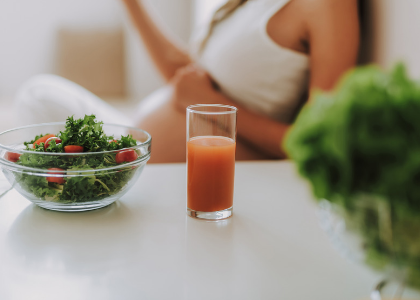
Is Juicing Safe For New Moms?
By Claire Georgiou, Reboot Naturopath, B.HSc ND
Can I do a juice fast after having a baby? I’m often asked this question in the Reboot community and I wanted to address this important topic.
After having a baby, you could be carrying some extra weight that you wish to lose, and juice cleansing seems like a good option that can make it happen fast! So why not?
The general rule of thumb is juice cleansing straight after having a baby is not ideal or recommended, particularly if you are breastfeeding.
After having a baby it is vitally important to eat a healthy whole-food diet high in protein, fiber, healthy fats, Omega 3s, vitamins, minerals and complex carbohydrates.
During postpartum, your body is doing deep tissue and cellular healing whether you had a natural birth or a C-section. In addition, the body has gone through many complex changes in the last 9 months, including more strain on your adrenals, hormones, liver and immune system.
Your body has grown an entire person and then the birth itself brings extra physical and emotional challenges so it’s important to make sure you’re well-nourished to accommodate all the physical challenges that have occurred.
The World Health Organization recommends 2-3 years between babies for women to allow the body to heal and rejuvenate after each baby – just to give you an idea on the demands a baby brings to the body.
Extra nutrition is required during these vital changes that are occurring via hormonal changes, increases in energy requirements, lactation, disturbed sleep and changes to brain health.
Some women may suffer with mood changes, postpartum depression, low hormones, fatigue, breastfeeding difficulties, slow healing and more post pregnancy. This is a very demanding time on the body so following some special guidelines are vital to enjoy good health in this very important special time.
Breastfeeding & Beyond
Juice fasting may not provide enough calories, fiber, essential fats and protein, particularly if you are breastfeeding.
I don’t recommend juice fasting while breastfeeding although including juices in your daily plan is highly recommended and provides many health benefits via increases in nutrients, antioxidants, anti-inflammatory plant compounds that will support healing and help increase your energy levels.
Including one to two servings of juice per day is a great starting point and can be included as soon as you wish. They can be enjoyed as a snack or an add-on to a healthy, well-balanced diet.
If you choose to juice cleanse postpartum and you are not breastfeeding, then I would suggest you wait a minimum of 12-16 weeks before partaking in a complete juice fast for a set period of time. It may be ideal to start with a short juice fast 3-15 days and observe how you feel. If you are unsure due to any health concerns then it’s important to discuss this with a qualified health practitioner.
You can also consider an eating and juicing combined plan where you only consume fruits and vegetables for 10-15 days. There is plenty of flexibility within our Reboot guidelines and plans.
10 Extra Nutrition Tips For New Moms
Postpartum nutrient demands are higher so it’s important to include all of these suggestions to support good health for you and your baby. Protein requirements need to be 25 percent higher during pregnancy and postpartum, as are mineral, vitamins and carbohydrate requirements.
- Eating a diet high in plants with an ideal consumption of 6 cups or more of vegetables per day with 50% green vegetables
- Consume 2-3 servings of fruit per day
- 2-3 servings of protein-rich food that may include wild or organic animal products or plant proteins such as nuts, seeds, legumes and whole grains
- Include fiber-rich foods
- Include healthy fats via nuts, chia seeds, flaxseeds, pumpkin and sunflower seeds, coconut oil and coconut flesh, avocado and wild fish
- Hydrate with plenty of filtered water
- Including whole grains such as quinoa, buckwheat, oats and brown rice
- Include fermented foods or a probiotic
- 1-2 juices or smoothies per day (80% vegetables/20% fruit)
- Include a high-quality breastfeeding supplement, if needed
Ensuring all of these vital nutrient requirements are met via a whole food plan will reduce the risk of fatigue, depression and other health concerns postpartum. This is such a special time and we want you to feel as healthy as possible so enjoy!